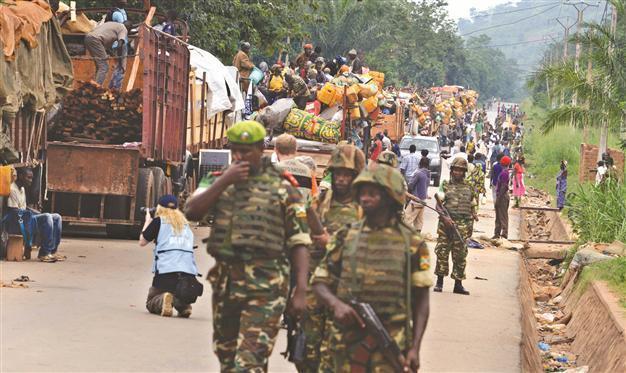Turkish Foreign Minister Davutoğlu to leave for CAR amid spiraling bloodshed
BANGUI / ANKARA

Soldiers from the Misca (Front), the African-led International Support Mission to the Central African Republic, stand guard by a convoy of vehicles carrying Muslims from the PK12 district, outside of Bangui, before it leaves the city.
AFP photo
Foreign Minister Ahmet Davutoğlu will pay a visit to the crisis-torn Central African Republic (CAR) April 29 as part of a fact-finding mission of the Organization of Islamic Cooperation (OIC) amid the continuing violence.
At least 22 people, including 15 local chiefs and three members of staff of the medical charity Medecins Sans Frontieres (MSF), or Doctors Without Borders, were killed over the weekend. The attack was in Nanga Boguila, about 450 kilometers north of the capital Bangui.
The sectarian violence erupted in the former French colony after mainly Muslim rebels of the Seleka alliance seized power for 10 months in March last year and rogue elements carried out atrocities against civilians. Mostly Christian communities then formed “anti-balaka” vigilante forces to wreak brutal revenge against Muslims. Once the government fell in January, Christian militia fighters began attacking Muslim civilians, prompting tens of thousands to flee the country, leaving an untold number dead. Interim authorities, backed by French and African peacekeepers, are still struggling to restore order and rights groups say parts of the country have experienced “religious cleansing.”
The OIC, meanwhile, is sending 14 delegates to the country today to lead a fact-finding mission, express solidarity with Muslims and to contribute to any peace talks. The organization said delegates will be in Bangui for three days. Guinea’s Foreign Minister Lounceny Fall will head the delegation, which will include Davutoğlu and other foreign ministers from the 57 member-states, as well as OIC Secretary-General Iyad Ameen Madani and the body’s special envoy to the Central African Republic, Sheikh Tidiane Gadio.
The delegates are expected to meet interim President Catherine Samba-Panza, the prime minister and foreign minister, as well as Muslim and Christian religious leaders. The OIC visit follows that of U.N. Secretary-General Ban Ki-moon, who was in the Central African Republic earlier this month. About a quarter of the population of 4.6 million have fled their homes, many of them internally displaced, while others have gone to neighboring countries, particularly Cameroon.
1,300 Muslims escapeOn April 27, some 1,300 Muslims left Bangui under heavy guard, deepening the religious divide in the strife-torn country. Piled along with their possessions aboard 18 articulated lorries, refugees left around midday accompanied by a large contingent of African peacekeepers, headed for the relative safety of the north.
Many could be seen raising their arms in celebration as the lorries picked up speed, finally leaving the rundown PK-12 ghetto on the outskirts of Bangui behind them. One told Agence France-Presse before leaving that 10 of his 12 children had been killed by militiamen in the central-west city of Bossembele, and that he had seen people “be blown apart by grenades.”
PK-12 is completely surrounded by a hostile mainly Christian community, and the Muslims had come under frequent attack. Just after the convoy set off, hundreds of youths descended on the ghetto to snatch items abandoned by the Muslims, such as clothes and the corrugated iron roofs under which they had been sheltered.
Tens of thousands have already fled north, almost emptying the south of the country to join those of their own faith, already strongly represented in the north. Others have crossed borders into Chad and Cameroon. They are being escorted by soldiers from France’s Operation Sangaris and troops of the multinational African mission MISCA, who together form a peacekeeping force of around 8,000. There are 6,000 African Union and 2,000 French troops in the country and the U.N. Security Council has approved plans to deploy a force of around 12,000 later this year.
